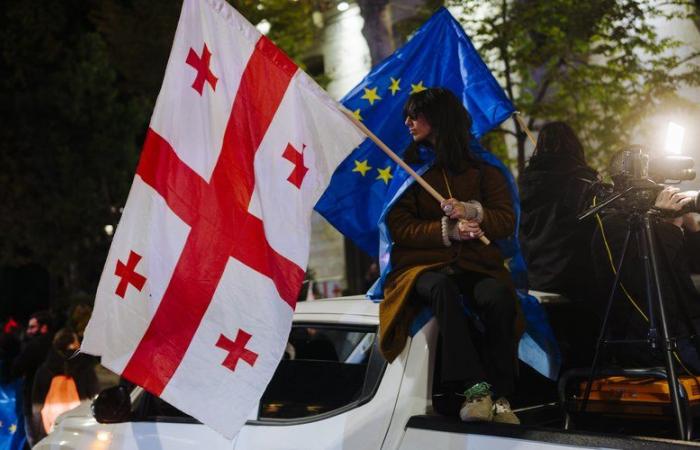
Thousands of Georgians gathered again this Friday, November 29, in the evening, in the center of Tbilisi at the call of the pro-European opposition, after the arrest of around forty demonstrators opposed to the government, accused of pro-Russian authoritarian drift.
This Caucasian country, accustomed to political crises, has been in turmoil since the legislative elections of October 26, won by the ruling Georgian Dream party, but declared as tainted by irregularities by the pro-Western opposition and the president, Salomé Zourabishvili.
Despite a heavy police presence, several thousand people gathered in front of the parliament building on Friday evening, blocking traffic on Tbilisi's main avenue.
“The self-proclaimed Georgian Dream government is doing everything it can to destroy Georgia's chances of joining the European Union,” protester Laura Kekelidze, a 39-year-old teacher, told AFP.
“They know that their authoritarian regime is incompatible with EU membership,” she said. “But Georgians are part of Europe, and that is why we are on the streets today.”
The Georgian Dream and the government that emerged from it are accused by their detractors of diverting this former Soviet republic from its ambition to join the European Union and, on the contrary, of wanting to bring Tbilisi closer to Moscow, while some of the Georgians view Russia, which invaded in 2008, as a threat and the West as a bulwark.
Georgia was granted candidate status for membership in December 2023, but Brussels has since frozen the process, accusing the government of serious democratic backsliding.
If the authorities still assure that they intend to join the EU in 2030, they announced Thursday evening to postpone the question until the end of 2028.
“Priority”
The move led thousands of pro-EU opposition supporters to take to the streets in protest, gathering in the capital Tbilisi and other cities overnight.
On Thursday evening and Friday morning, riot police fired rubber bullets and used tear gas and water cannons, hitting demonstrators and journalists in front of Parliament, an AFP journalist noted.
Opposite, the demonstrators had erected barricades which they set on fire.
On Friday, Prime Minister Irakli Kobakhidze insisted that his country's integration into the EU “by 2030” remained his “number one priority”.
According to the Interior Ministry, “43 people were arrested” during the night from Thursday to Friday. According to him, 32 police officers were injured “as a result of illegal and violent actions by demonstrators”.
The opposition is boycotting the new Parliament and demonstrations follow one another, so far without causing any pressure on the government.
Ms. Zourabichvili, at odds with the government, has only limited powers and her mandate ends this year, but she demands that the Constitutional Court annul the results of the legislative elections, a request which has little chance of succeeding.
She decreed the “repression” of the demonstrations and called for a “firm reaction from European capitals”.
The Council of Europe for its part “strongly condemned” the “brutal repression of demonstrations” in Tbilisi, also expressing alarm at the decision of the Georgian government to postpone its European ambitions until 2028.
Ukraine also said it was “disappointed” with this decision, even though this country experienced a pro-European revolution in 2014 after the pro-Russian authorities at the time had tried to maintain the EU integration process. .
“This decision, as well as the use of force against a peaceful demonstration, demonstrates the limitation of democratic processes in the country to please Moscow,” Ukrainian diplomacy said.
“Blackmail”
On Thursday, the European Parliament adopted a resolution rejecting the results of the legislative elections in Georgia, denouncing “significant irregularities”.
The text demands that a new control be organized under international supervision and that sanctions be taken against senior Georgian officials, including Irakli Kobakhidze.
In response, the latter, in office since February and confirmed Thursday by MEPs, accused the European Parliament of “blackmail”.
Irakli Kobakhidze, who already criticized the EU and the United States for wanting to drag Georgia into the war between Russia and Ukraine, asked Thursday, before the deputies, that Brussels “respect” Georgian national interests and its “traditional values”.





